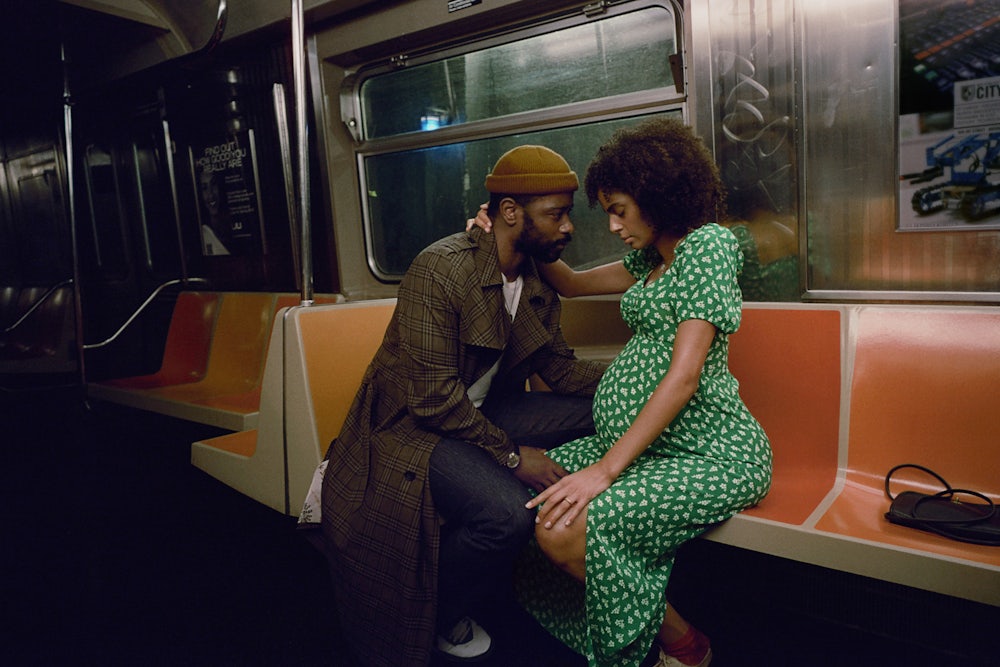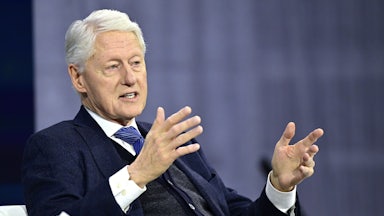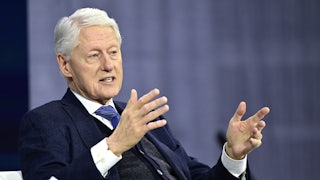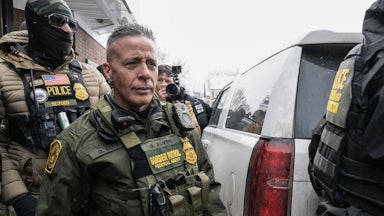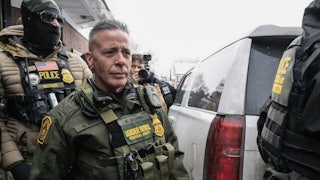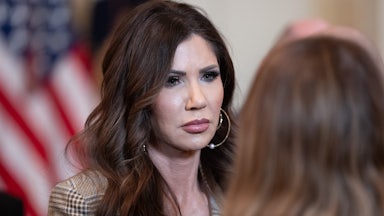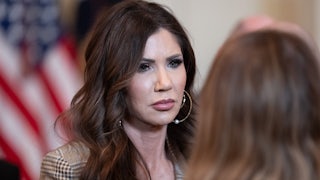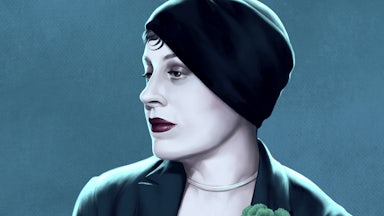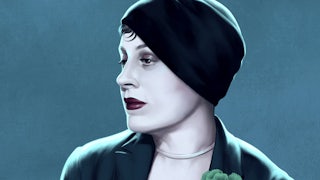Last fall, a TV series premiered about a man in New York City whose wife has disappeared without a trace. He searches for her in vain, both longing for his lost love and furious with her for her transgression against him and their children. As he embarks upon this quest, the very cityscape of Manhattan turns itself upside down, a repeated cinematographic trick meant to visually emphasize the degree to which this man’s reality has been unsettled by loss. As viewers, we are so close to his perspective that his anger and his grief are palpable; they are the ground upon which we walk.
But then, there’s a twist! In the penultimate episode, we see the show’s events from the point of view of the lost wife. In place of this man’s story of abandonment and betrayal, we see a woman’s story of pain disbelieved, of subjectivity unrecognized, of trauma ignored. The man, it turns out, was the source and amplifier of this woman’s anguish rather than the hero seeking to save her from it. The twist comes late enough that we end up spending much more time with that guy anyway, but still: The story you thought you were watching was not the story you were actually watching all along.
The show I’m talking about, of course, is FX’s Fleishman Is in Trouble, Taffy Brodesser-Akner’s 2022 comedy of manners about wealthy New Yorkers in crisis, but nearly every description I’ve offered—down to the topsy-turvy camera gimmick—might also apply to Apple TV+’s new horror-drama The Changeling. The show is an ambitious, and relatively faithful, adaptation by veteran screenwriter Kelly Marcel of Victor LaValle’s acclaimed 2017 novel of the same name, and it’s characterized by the novel’s signature melting pot of cultural, historical, and mythical references. Nominally the story of a couple going through the turmoil of new parenthood, it’s also, explicitly, a fairy tale, replete with witches and mole people and fairies.
Like Fleishman, the show is centrally concerned with modern parenthood, but The Changeling intermingles the mundanities of child-rearing with the marvelousness of folklore. So, alongside contemporary tales like the hero’s journey of the “good dad” and the almost supernatural, enforced invisibility of women’s pain, we have Scandinavian mythology, urban legend, and even social media typologies. North Brother Island in the East River becomes a locus of sorcery and enchantment; the nurseries and playgrounds of infanthood attain the same level of magic and dread by association.
But, also like Fleishman, The Changeling tells the story of a woman’s pain by way of her husband. In Fleishman, the real story was always that of a woman erased, not a woman missing. We are meant to be chastened as viewers when we realize how credulously we had believed the man’s version of events. The Changeling’s tale of a woman’s pain is less hidden from us than it is smothered by a television series too busy, too pleased with its own bravado, to give it the time and attention it deserves. Why are we spending so much time inside the Trojan horse?
The Changeling begins in 1968 with the meet-not-so-cute of white parole officer Brian West (Jared Abrahamson) and recent Ugandan immigrant Lillian Kagwa (played by Alexis Louder in flashback and Adina Porter in the present). Brian asks Lillian out on a date, and she refuses him, but he persists, asking and asking until she finally relents nearly 10 years later. They marry and have a son named Apollo. Thirtysomething years later, Apollo (played by a number of actors at different ages but finally LaKeith Stanfield in the present) has his own chance encounter with the lovely, hard-to-get Emma (Clark Backo). Their early relationship uncannily echoes that of Apollo’s own parents: Emma, like Lillian, agrees to her suitor’s overtures only after multiple rejections; on the first date, Apollo, like Brian, very bluntly declares that his main goal in life is to have children and be a good father; both couples appear to fall instantly in love. You may find these gestures a bit aggressive, though it’s sometimes unclear whether the show finds them romantic, threatening, or some mixture of both.
The wrinkles in these parallel stories are the source of the show’s main mysteries. In the earlier timeline, the main puzzle is Brian’s abandonment of Lillian and Apollo, as well as the later arrival of a box of his belongings labeled IMPROBABILIA, which contains, among other things, an eerie children’s book about fairies who like eating babies. The wrinkles in the present timeline both focus on Emma. In between her first date with Apollo and their eventual marriage, Emma goes on a months-long journey to Brazil. There, against the advice of locals, she visits a witch who ties a red string around her wrist and grants her three wishes. Upon her return, Emma relays this story to Apollo, who utters his catchphrase—“I am the god Apollo”—and cuts the string from her wrist. “With me, all three of your wishes will come true,” he tells her. Again, it sounds like a threat.
The two soon marry, and Emma announces she’s pregnant. In a harrowing and surprisingly funny set piece, Emma gives birth in a subway car—a crew of subway dancers provide moral and logistical support—but life after baby is no fairy tale, or at least not a Disney one. After her brief parental leave, Emma begins to exhibit symptoms of postpartum depression, anxiety, and even psychosis. She also begins to receive strange text messages with pictures of her baby that appear to have been taken from a distance, and which disappear from her phone before she can show them to anybody. During this time, Emma comes to believe that her son has been replaced by unseen forces, and that the baby she and Apollo now care for is a changeling.
Clark Backo is very simply an electrifying actor. When The Changeling is able to pull off its magical realist gambit, it is almost always because of Backo’s versatile performance. Emma visits a priest and schedules a baptism in the last-ditch hope that maybe the Holy Spirit can intercede in whatever’s going on in her life. We see her pitch the idea to Apollo—a god, but also an atheist—and later we see her meet the priest in flashback. In both scenes, we watch Backo alternate between the scary certainty of a mind possessed and the unnerving chaos of a mind ill-at-ease. These interpretations flit visibly past each other on Backo’s face—both conveying the reality of a woman in the midst of a real-life horror story and making us question what is true.
But The Changeling is not a show about Emma; it’s a show about her disappearance. And so, after she commits a horrifically violent act (off-screen, thank goodness) and subsequently vanishes, the show follows Apollo on his search for her. He finds a rare book, meets and joins forces with a troll, and he discovers a colony of feminist witches in the East River. Amid these incredibly confusing events, he shows an extraordinary lack of curiosity, rarely asking his captors and interlocutors the questions he—and we as viewers—need answered in order to move forward. His egotism and myopia further blur our view of the larger puzzle. He exudes an unshakable confidence in his own righteousness, whether he is flashing back to Emma telling him what a good father he will be or winning over the witches with his dadly energy. “You’re a good man,” one of them tells him, for seemingly no reason at all other than that he showed up.
On its own, this might be a keen insight about contemporary parenting, that women have to work three times as hard to be seen as competent parents, while men are greeted as feminist heroes for solo outings with their infant children. But the show doesn’t exactly go in that direction: While The Changeling spends a good amount of time on the various betrayals and complex ethical negotiations that define “good” motherhood, Apollo’s status as a “good father” is relatively unquestioned. The Changeling wants to—and frequently does—use Emma to tell a knotty, empathetic story about the violence and longing inherent in motherhood. Apollo, meanwhile, declares his intention to be a good father in the pilot, and the show simply grants his wish.
In a great 2018 essay, the critic Lili Loofbourow describes a media environment well aware of the grip “the male gaze” once had on Hollywood. Filmmakers and showrunners might want to avoid the lurid objectification of women, but they have replaced that gaze with what she calls “the male glance.” Instead of being leered at, women are simply ignored, not attended to at all. “Rather than linger lovingly on the parts it wants most to penetrate,” Loofbourow writes, the male glance “looks, assumes, and moves on.” It is a means of dismissing women’s stories as not worth the trouble, “forgetting to zoom in,” as Loofbourow elsewhere writes. Rather than settling into voyeurism, we don’t watch at all.
Sometimes, then, narratives about women’s pain—childbirth, routine medical procedures performed without anesthesia, the disbelief and dismissal that greets women suffering from postpartum depression, anxiety, or psychosis—come to us initially through the stories of their husbands or partners. Granted this cultural power of magnetism and capaciousness, a canny writer might wonder if that male magnetism was enough to draw viewers into women’s stories they might not otherwise encounter; what if that capaciousness were enough to hold them? So, up rolls the Trojan horse.
To The Changeling’s credit, it does not simply sign over Emma’s story to Apollo. We certainly view her own experience earlier and more often than Fleishman allows. But it’s not only Apollo working to avert our eyes from Emma: Her horror story frequently gets lost beneath the spectacle of all this revisionist mythmaking. Though sometimes we encounter a thrilling admixture of myth and reality, each episode calls upon so many different touchstones with such frenetic frequency that it can’t possibly do them all justice. One episode hopscotches between the 1968 New York City garbage strike, a shadow play of the Ugandan genocide, and a mournful fantasy about the early AIDS crisis—all as background for the story of one marriage’s dissolution. The show simply doesn’t have enough time to do more than transform these events into metaphors at best or background scenery at worst. As visually striking as it is, it’s hard to feel that the scene in which two Lena Horne impersonators sing the entirety of “Stormy Weather” to a naked man dying of AIDS is an earned moment, considering that the AIDS crisis has no overt bearing on the rest of the plot, and the man himself is a figment of another character’s imagination.
In a version of this series that accomplished all it’s trying to do, every one of these fantastical diversions and gritty realities would play into one another, each reinforcing some unexpected other element of the story, producing a sense of organic connection, of historical and spiritual transcendence. As one character explains, “the new fears are the old fears, and the old fears are ancient.” More often, though, the show feels distracted by all of its elements. Their resonances come off as strained or thin rather than revelatory, their invocations neither infectiously playful nor movingly serious.
Both for its promise and its missteps, then, The Changeling can be a frustrating show to watch. The witch whom Emma eventually meets in the middle of the East River promises her, and all the other women she finds there, “a place where they will be believed.” The show believes Emma, too; it just won’t stay with her, for reasons both fantastical and familiar.
